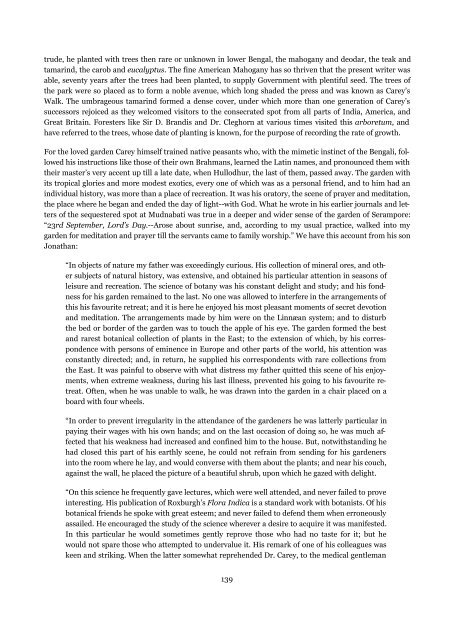Life of William Carey by George Smith - The Jesus Army
Life of William Carey by George Smith - The Jesus Army
Life of William Carey by George Smith - The Jesus Army
Create successful ePaper yourself
Turn your PDF publications into a flip-book with our unique Google optimized e-Paper software.
trude, he planted with trees then rare or unknown in lower Bengal, the mahogany and deodar, the teak and<br />
tamarind, the carob and eucalyptus. <strong>The</strong> fine American Mahogany has so thriven that the present writer was<br />
able, seventy years after the trees had been planted, to supply Government with plentiful seed. <strong>The</strong> trees <strong>of</strong><br />
the park were so placed as to form a noble avenue, which long shaded the press and was known as <strong>Carey</strong>’s<br />
Walk. <strong>The</strong> umbrageous tamarind formed a dense cover, under which more than one generation <strong>of</strong> <strong>Carey</strong>’s<br />
successors rejoiced as they welcomed visitors to the consecrated spot from all parts <strong>of</strong> India, America, and<br />
Great Britain. Foresters like Sir D. Brandis and Dr. Cleghorn at various times visited this arboretum, and<br />
have referred to the trees, whose date <strong>of</strong> planting is known, for the purpose <strong>of</strong> recording the rate <strong>of</strong> growth.<br />
For the loved garden <strong>Carey</strong> himself trained native peasants who, with the mimetic instinct <strong>of</strong> the Bengali, followed<br />
his instructions like those <strong>of</strong> their own Brahmans, learned the Latin names, and pronounced them with<br />
their master’s very accent up till a late date, when Hullodhur, the last <strong>of</strong> them, passed away. <strong>The</strong> garden with<br />
its tropical glories and more modest exotics, every one <strong>of</strong> which was as a personal friend, and to him had an<br />
individual history, was more than a place <strong>of</strong> recreation. It was his oratory, the scene <strong>of</strong> prayer and meditation,<br />
the place where he began and ended the day <strong>of</strong> light--with God. What he wrote in his earlier journals and letters<br />
<strong>of</strong> the sequestered spot at Mudnabati was true in a deeper and wider sense <strong>of</strong> the garden <strong>of</strong> Serampore:<br />
“23rd September, Lord’s Day.--Arose about sunrise, and, according to my usual practice, walked into my<br />
garden for meditation and prayer till the servants came to family worship.” We have this account from his son<br />
Jonathan:<br />
“In objects <strong>of</strong> nature my father was exceedingly curious. His collection <strong>of</strong> mineral ores, and other<br />
subjects <strong>of</strong> natural history, was extensive, and obtained his particular attention in seasons <strong>of</strong><br />
leisure and recreation. <strong>The</strong> science <strong>of</strong> botany was his constant delight and study; and his fondness<br />
for his garden remained to the last. No one was allowed to interfere in the arrangements <strong>of</strong><br />
this his favourite retreat; and it is here he enjoyed his most pleasant moments <strong>of</strong> secret devotion<br />
and meditation. <strong>The</strong> arrangements made <strong>by</strong> him were on the Linnæan system; and to disturb<br />
the bed or border <strong>of</strong> the garden was to touch the apple <strong>of</strong> his eye. <strong>The</strong> garden formed the best<br />
and rarest botanical collection <strong>of</strong> plants in the East; to the extension <strong>of</strong> which, <strong>by</strong> his correspondence<br />
with persons <strong>of</strong> eminence in Europe and other parts <strong>of</strong> the world, his attention was<br />
constantly directed; and, in return, he supplied his correspondents with rare collections from<br />
the East. It was painful to observe with what distress my father quitted this scene <strong>of</strong> his enjoyments,<br />
when extreme weakness, during his last illness, prevented his going to his favourite retreat.<br />
Often, when he was unable to walk, he was drawn into the garden in a chair placed on a<br />
board with four wheels.<br />
“In order to prevent irregularity in the attendance <strong>of</strong> the gardeners he was latterly particular in<br />
paying their wages with his own hands; and on the last occasion <strong>of</strong> doing so, he was much affected<br />
that his weakness had increased and confined him to the house. But, notwithstanding he<br />
had closed this part <strong>of</strong> his earthly scene, he could not refrain from sending for his gardeners<br />
into the room where he lay, and would converse with them about the plants; and near his couch,<br />
against the wall, he placed the picture <strong>of</strong> a beautiful shrub, upon which he gazed with delight.<br />
“On this science he frequently gave lectures, which were well attended, and never failed to prove<br />
interesting. His publication <strong>of</strong> Roxburgh’s Flora Indica is a standard work with botanists. Of his<br />
botanical friends he spoke with great esteem; and never failed to defend them when erroneously<br />
assailed. He encouraged the study <strong>of</strong> the science wherever a desire to acquire it was manifested.<br />
In this particular he would sometimes gently reprove those who had no taste for it; but he<br />
would not spare those who attempted to undervalue it. His remark <strong>of</strong> one <strong>of</strong> his colleagues was<br />
keen and striking. When the latter somewhat reprehended Dr. <strong>Carey</strong>, to the medical gentleman<br />
139
















